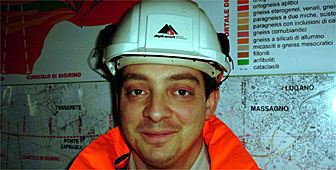Dario Ballanti: AlpTransit, a project benefiting the whole of Europe

AlpTransit is a highly ambitious project in Switzerland: it involves the construction of two new alpine railway crossings, including the 57-kilometre St Gotthard base tunnel, which will be the longest in the world.
As public relations manager for AlpTransit, Dario Ballanti works at Faido and Bellinzona.
“I became involved in this adventure quite by chance, even though I am well qualified for it by virtue of my doctorate in geology and earth science at the Swiss Federal Institute of Technology in Zurich, and my previous job as a parliamentary journalist in Bern.
At AlpTransit, I am able to combine these two interests working for a historic project. It represents an investment of SFr30 billion and will employ 2,000 workers for 20 years constructing two new alpine crossings – the St Gotthard and Lötschberg railway tunnels.
The concept of AlpTransit derives from Switzerland’s transport policy in recent years, one aim of which is to build a low-altitude railway line as an alternative to the current lines with steep gradients.
At present, trains crossing the Alps have to climb to Airolo and Göschenen, at 1,100 metres above sea level. In 2015, when the St Gotthard base tunnel is finished, they will enter at Bodio and Erstfeld at a mean altitude of just 550 metres.
This is a great challenge, not just from the technological and civil-engineering point of view, but also in ecological terms. A special group has been appointed by AlpTransit to consider all the environmental problems and set limits for particles and other harmful wastes, which need to be properly treated before being re-released into the atmosphere or water.
For Switzerland, and for Europe as a whole, the St Gotthard base tunnel is a project of great importance. The Alps have always formed an almost insurmountable natural obstacle to traffic between north and south.
This project will make it possible to cross the mountain barrier far more rapidly, and will reduce the harmful effects of road transport, with most goods consignments being transferred to the railway.
The new tunnels will also change people’s working and leisure habits. For example, it will be possible to live in Ticino and work in German-speaking Switzerland; or travel from Zurich to Ticino to spend the evening in a typical local restaurant and return home the same day. This will be possible because train journey times between Ticino and the rest of Switzerland will be halved.
These concepts are already a reality at AlpTransit: the central management is based in Lucerne, while I actually work in Faido and Bellinzona.
How strange life is! When I was a parliamentary correspondent, I worked in central Switzerland for a Ticino-based newspaper; now I work in Ticino for a company based in central Switzerland.”
Dario Ballanti

In compliance with the JTI standards
More: SWI swissinfo.ch certified by the Journalism Trust Initiative
You can find an overview of ongoing debates with our journalists here . Please join us!
If you want to start a conversation about a topic raised in this article or want to report factual errors, email us at english@swissinfo.ch.